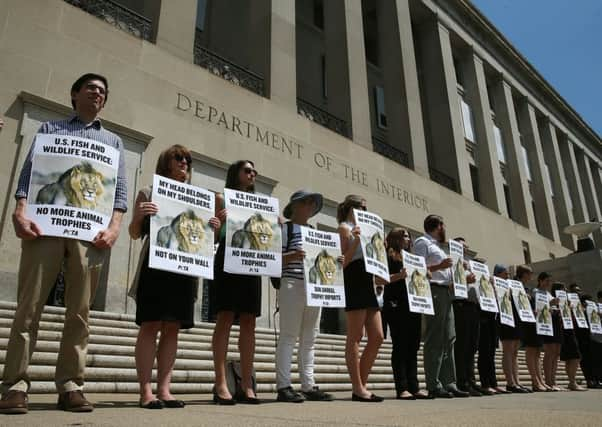South Africa and Namibia hit out hunting trophy ban


South Africa is disappointed at Delta Air Lines’ announcement this week that it will no longer accept lion, leopard, elephant, rhino and buffalo trophies, the environment ministry said on Thursday.
“The decision by Delta Air Lines to enforce a blanket ban fails to distinguish between the trade in and transportation of legally acquired wildlife specimens, and the illegal exploitation and trade in wildlife specimens,” the ministry said in a statement.
Advertisement
Hide AdAdvertisement
Hide AdSouth Africa has been struggling to contain a record surge in rhino poaching, and poachers have slaughtered tens of thousands of elephants annually for their ivory around Africa in recent years.
Neighbouring Namibia also warned that a ban by airlines on trophy transportation will hurt its economy and conservation efforts that rely on revenue from hunters.
“This will be the end of conservation in Namibia,” the Namibia Press Agency quoted Pohamba Shifeta, the environment and tourism minister, as saying.
South Africa says that if hunters can’t take their animal trophies home, a hunting industry worth nearly $500 million a year will suffer, affecting jobs and community development. In Namibia, more than 80 registered Namibian wildlife conservancies depend largely on funding from trophy hunting, according to the Namibia Press Agency.
“If conservancy members have no income, they will abandon their role in protecting the country’s natural resources,” Shifeta said.
“These anti-trophy hunting campaigns are very serious as many countries are joining the chorus now,” Shifeta said. “It will also be uphill for the hunter if trophies are not to be shipped.”
American Airlines and United Airlines announced a similar hunting trophy ban this week, though it is unclear how many trophies, if any, they have been carrying in recent years. Other airlines announcing bans include Air Canada, Air France and Qantas.
The bans come amid international outrage over the killing by an American hunter, accompanied by professional hunter Theodore Bronkhorst, of well-known lion Cecil in Zimbabwe.
Advertisement
Hide AdAdvertisement
Hide AdSeveral other airlines have followed Delta’s example and banned the carrying of hunting trophies, such as Qatar Airways which announced the extension of its existing embargo on transporting hunting trophies to encompass all species identified by the Convention on International Trade in Endangered Species (CITES) of Wild Fauna and Flora.